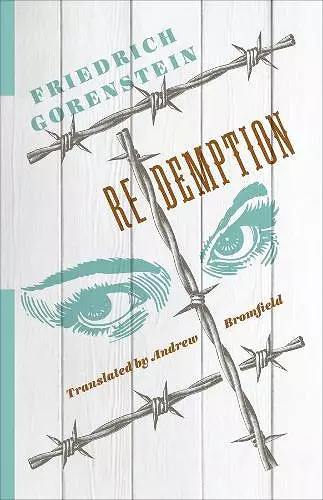Redemption
Friedrich Gorenstein author Andrew Bromfield translator Emil Draitser editor
Format:Paperback
Publisher:Columbia University Press
Published:30th Oct '18
Should be back in stock very soon

It is New Year’s Eve 1945 in a small Soviet town not long liberated from German occupation. Sashenka, a headstrong and self-centered teenage girl, resents her mother for taking a lover after her father’s death in the war, and denounces her to the authorities for the petty theft that keeps them from going hungry. When she meets a Jewish lieutenant who has returned to bury his family, betrayed and murdered by their neighbors during the occupation, both must come to terms with the trauma that surrounds them as their relationship deepens.
Redemption is a stark and powerful portrait of humanity caught up in Stalin’s police state in the aftermath of the war and the Holocaust. In this short novel, written in 1967 but unpublished for many years, Friedrich Gorenstein effortlessly combines the concrete details of daily life in this devastated society with witness testimonies to the mass murder of Jews. He gives a realistic account of postwar Soviet suffering through nuanced psychological portraits of people confronted with harsh choices and a coming-of-age story underscored by the deep involvement of sexuality and violence. Interspersed are flights of philosophical consideration of the relationship between Christians and Jews, love and suffering, justice and forgiveness. A major addition to the canon of literature bearing witness to the Holocaust in the Soviet Union, Redemption is an important reckoning with anti-Semitism and Stalinist repression from a significant Soviet Jewish voice.
Redemption is awash with brutal truths, rude awakenings and painful self-discoveries. Gorenstein doesn't make it easy for his reader: His forbidding theme is the aftermath of the Holocaust — the aftershock of 'ineluctable, planned murder' — and his protagonist is an unsympathetic young woman. But the darkness is not total; there are numerous glints of light, even pockets of beauty. Gorenstein skillfully crafts scenes, paints landscapes and conveys moods. We move from the shabby elegance of the ball to the snowy streets with their burned-out ruins. We watch with morbid fascination as Sashenka inflicts damage on others and then herself. Punctuating her many trials and errors are searching meditations on suffering and salvation, love and fate. -- Malcolm Forbes * Star Tribune *
Set immediately after World War II in a Soviet town emerging from German occupation, Friedrich Gorenstein’s Redemption is a small masterpiece of post-Holocaust fiction. Vividly translated by Andrew Bromfield, this is a gripping book—full of searing psychological portraits threaded across intersecting social, political, and historical microcosms. Redemption startles the reader with its emotionally and philosophically vivid account of sex and violence and the strange horizons of love. -- Val Vinokur, The New School
Bromfield’s translation of Gorenstein’s Redemption peels away the layers of the still underexamined archive of the Holocaust in the USSR. In the immediate aftermath of the war with Nazi Germany, denizens of a town in Soviet Ukraine begin to face the consequences of the wartime treatment of their Jewish neighbors. Official documents and witness reports crowd in on personal recollections of perpetrators, survivors, and their progeny in a narrative that shifts between stylistic registers as it challenges the contours of collective memory and individual responsibility. I’m thrilled that this work by an important Russian author is now available to the English-language reader. -- Sasha Senderovich, University of Washington, Seattle
A master of episodic narration. . . . Gorenstein also proves to be a keen observer and radically critical chronicler of Soviet society. -- Heinz Ludwig Arnold, Frankfurter Allgemeine Zeitung
Told honestly but philosophically, this is the story of two young people’s love in the aftermath of World War II, as some traumas were healing and others were only beginning, laying bare the underacknowledged Holocaust in the USSR. * World Literature Today *
The cast of Redemption is destitute, traumatized, and beset by a restless police apparatus hunting out wartime collaborators. They are constitutionally unfit to bring new life into the world — yet they do: securing food and heat, having parties, making babies, and burying the dead. All of it, the book argues, is the result of ineluctable forces — biological, tectonic, geothermal — rather than proof of any spiritual or ideological purpose. The countless victims of the war have not been redeemed by the living; their murders won’t be paid back. Indeed, the novel’s beauty and its truth rest on the knowledge that redemption is inconceivable and that life persists in its absence. -- Leeore Schnairsohn * Los Angeles Review of Books *
Friedrich Gorenstein (1932-2002) is a major figure in the history of 20th-century Russian literature—and a most curious one. On the one hand, his novels blend fiction with religion, philosophy, and politics in a way that is quintessentially Russian, reminiscent of writers from Dostoyevsky and Tolstoy to Chekhov and, in the 20th century, Andrei Platonov. On the other hand, throughout his voluminous body of work, he defiantly tackles those selfsame issues as a Jewish writer, a Jewish thinker, and an uncompromising Jewish voice. . . . The power of Gorenstein’s writing lies in the fact that his weighty, nuanced, and idiosyncratic political and religious imagination is channeled through a spellbinding lyrical style. -- Marat Grinberg * Mosaic *
ISBN: 9780231185158
Dimensions: unknown
Weight: unknown
232 pages